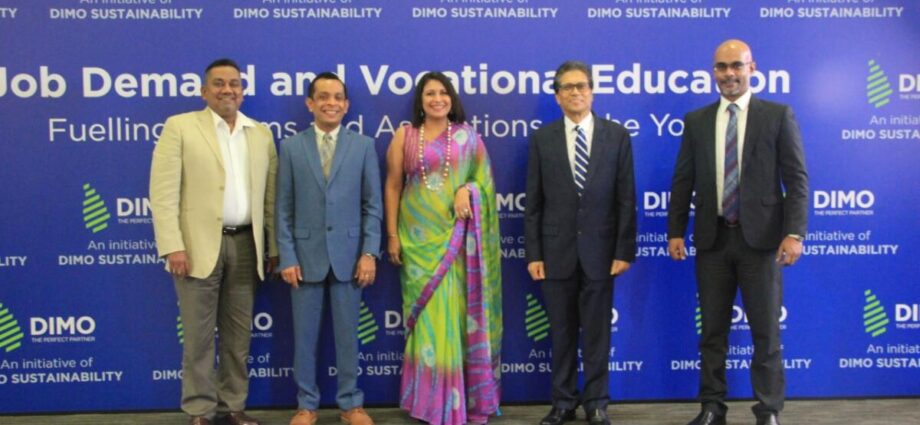DIMO, one of the leading conglomerates in Sri Lanka, celebrated ‘World Youth Skills Day’ by shining the spotlight on the importance of equipping the youth with skills for employment, decent work and entrepreneurship, through a webinar titled ‘Job Demand and Vocational Education – Fuelling Dreams and Aspirations of the Youth’, held recently.
The keynote speaker at the webinar was a renowned expert in the industry, Mangala P.B. Yapa the Director General / CEO of Employers’ Federation of Ceylon, while the panel consisted of leading Human Resources professionals Dilrukshi Kurukulasuriya the Chief Human Resources Officer of DIMO, Chinthaka Premaratne the Group Director Human Resources of Fairway Holdings and Ishan Dantanarayana the Group Chief People Officer of Brandix. The event was moderated by Yohan Thilakaratne the Head of Corporate Communications of DIMO. Vocational Training is a key attribute in DIMO’s sustainability agenda and the forum ‘Job Demand and Vocational Education – Fuelling Dreams and Aspirations of the Youth’ was the latest initiative of DIMO to empower the dynamic youth with the correct skills.
During his keynote address, Mangala P.B. Yapa stated, “Knowledge, skills and employment are 3 elements that are inter-connected in a complex manner. Today, knowledge has surpassed skills and therefore, receives prominence. However, I believe that knowledge which does not develop skills, does not do justice to society. Through vocational education, what we attempt to do is to develop both knowledge and skills.” He also added that knowledge is important but one should never be a slave of it as learning and unlearning are two concepts that are vital nowadays. He elaborated on the term “know how” by quoting Ricardo Hausmann, a professor at University of Harvard, who had stated, “Economies grow by adding new products and services to their production portfolio, and not by producing more of the same kinds of products. The key to such diversification is access to know-how.” In conclusion, he added that one of the best ways to realise a person’s dreams is the relevant vocational education. He emphasized on the importance of embracing vocational education to fulfil one’s potential and realize one’s dreams.
Addressing the reluctance of today’s younger generations to get into vocational training, Chinthaka Premaratne stated, “If you look at different generations, Baby Boomers are retired while some parts of Gen X are also retired, on top of which the COVID-19 pandemic has accelerated people retiring and moving out of jobs. As there is an increase in demand for various types of degrees, there are different educational institutions providing all types of degrees. These degree holders will eventually look for an office job, creating a skills gap when it comes to individuals with vocational skills. Additionally, while technology has helped us, it has also made the younger generations reluctant to do ‘physical’ jobs. They just want to sit at a desk and have everything at their fingertips. Also, if you look at some jobs, such as driving a three-wheeler or a cab, there is a certain amount of freedom and flexibility that they offer as the person can work whenever he or she wants. These are all obstacles that keep today’s younger generations away from vocational training.”
Sharing her thoughts on the female participation in vocational training Dilrukshi Kurukulasuriya stated, “Females make up over 50% of the population but unfortunately there is not enough participation by them in economic activities. It is clear that the lack of female participation is not as a result of lack of knowledge and skills, as females are definitely equally capable. What is required is a change in perception across the board, including in the females themselves, as social norms and parental expectations are holding them back. For example, if you look around, you’ll see that the job of a Gantry Crane Operator, known to be one of the toughest jobs, has female team members here in Sri Lanka. Likewise, I want to emphasize to all females out there that there are plenty of job opportunities in non-conventional jobs such as auto mechanics, technicians, machine operators and many others. It’s just a matter of them getting the right vocational training, setting a target and going for it.”
Speaking about his views on the emergence of technology in organisations and how it affects vocational employment opportunities, Ishan Dantanarayana stated, “Technology plays a huge role in aspects such as business transformation, change management, and agile processes. Organisations leverage technology to address different challenges such as how to embrace automation, change systems and processes to save time and money, reduce costs when manufacturing a new product and accelerate the launch of products into the market. When technology changes rapidly we need people with the proper skillsets to adapt these technologies and that is where people with vocational training are highly important. While technology may reduce the need for human intervention in some jobs, in order to have the technologies working smoothly you need people with vocational training. So, as the use of technology becomes greater, so will the need for such individuals with vocational training.”
The webinar also touched upon the importance of soft skills for vocational training. Some of these include having an open, inquisitive mind, willingness to learn, ability to learn new things and improve, possessing a positive “can do” attitude, understanding that education is a continuous journey and always being prepared to learn from others even after one reaches the top of his or her field.
DIMO will continue to conduct similar initiatives and forums to educate the Sri Lankan youth about the importance of selecting vocational education and the potential it has for providing fulfilling employment opportunities and exciting career prospects in today’s fast-changing world.
ENDS
Photo Caption
- Speakers at the panel discussion
